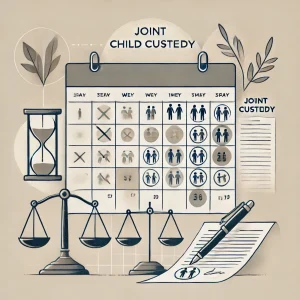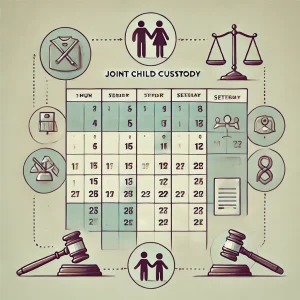Divorce is a complex and painful process that can lead to arguments and quarrels, especially when children are involved. One of the major issues to be decided in divorce is child custody in divorce. It should be noted that according to the law, parents are the guardians of their children until the age of eighteen, so in the event of a divorce, it must be decided which parent they will stay with.

In most divorce cases the child custody will be in the custody of the mother automatically, especially if they have not turned six. When the couple is unable to decide among themselves who will be the custodian, they can file, individually, a child custody claim in divorce, in family court or in a rabbinical court.
Joint Custody Conditions – The overriding principle for determining custody is the best interests of the child. The desire is to leave the child with the most appropriate parent according to metrics – such as the degree of connection between the parent and the child, the parent’s availability and the degree of closeness and listening of the parent to the child. The court decision also includes the will of the child, if he is over the age of ten. Before this age the assumption is that the child is not yet able to form a firm position. In addition, the court makes sure that neither parent manipulates the child.
Many times the court appoints a social worker to provide an opinion on the child or the judge meets with the child alone. There is a difference between the will of the child and the principle of “the best interests of the child”, which is his mental and physical health, the important figures in the child’s life, the age and developmental needs of the child and more. The court thoroughly examines the best interests of the child at a given time and thereafter.
If the court fails to rule on child custody in a divorce, it can decide on the basis of a parental capacity test. In order to do so, the parents and children must undergo tests and diagnosis from which it is possible to deduce the degree of interaction between the parents and the children. These tests and diagnoses are performed by professionals such as social workers and they submit a review to the court. After submitting the survey it is possible to question the professionals such as social workers who conducted the survey in court and make a decision regarding child custody in divorce. It should be noted that the determination regarding custody can be changed later mainly due to changes in the circumstances or will of the children.
Divorce proceedings are not a pleasant thing and in many cases it even reaches jarring tones, and it is not certain that both parties wanted it in the first place. Divorce involves quite a few emotions and feelings because of the reasons for divorce that can be: one spouse hurting the other spouse which creates in the other spouse the desire for revenge, and can cause quite a few complications due to joint assets and the like. But sometimes spouses who come to a divorce proceedings forget that there is something else important and that is the children, or rather they of course remember their children but forget that they are the main victims of it.
he court ensures that the children also have contact with the non-custodial parent and that the custodial parent does not incite the children against the non-custodial parent. The court also takes into account the need of the non-custodial parent to be close to their children and involved in their lives. The court determines the times when stay arrangements will take place and the spouse will visit his or her children. The frequency of the sessions depends on the age of the child. Most stay arrangements include twice-weekly meetings at regular hours and every second weekend. The holidays are divided alternately and on holiday the meetings are more frequent than on school days.
Stay arrangements relate to the division of parents’ time spent with the children. In a divorce proceeding there is one party who “accepts the children to him” (custody), and another party who receives the right to see them. In most cases the children are with the mother and only in cases where there is a fear of violence or the mother cannot raise them herself, will the children be transferred to the custody of their father.
The usual stay arrangements between the father and the children are twice a week, including accommodation and every second weekend.
Obviously you have something to lose in a divorce battle and not just money! You may lose control of your business, your freedom and your relationship with the children if you do not manage things wisely. With 2 decades of experience in achieving fair divorce agreements I will answer you in advance on a large part of your questions and concerns and show you how to avoid legal and financial problems. Joint custody is custody in which both parents share the time spent with the children equally, or almost equally.
Recently there has been a change in the court’s perception of the issue of custody and the issue of joint custody, and the understanding has risen that the best thing for the child is to be with both parents, as much as possible. For another article on joint custody without alimony, click here >>>
Obviously you have something to lose in a divorce battle and not just money! You may lose control of your business, your freedom and your relationship with the children if you do not manage things wisely. With 2 decades of experience in achieving fair divorce agreements I will answer you in advance a large part of your questions and concerns and show you how to avoid legal and financial problems. Joint custody is custody in which both parents are equally, or almost equally, present in the life of their joint child.
In recent years, , a new trend has slowly emerged among the courts, social workers, welfare officials, and all those involved in family law and child custody, that for the sake of the development of the child, it is better and worthwhile for both parents to be present in his life. For another reading on joint custody, click here >>>
Joint custody is a custody in which, as a rule, the child’s time spent with his parents is half – half. It is well known that the child needs both parents to be present in his life, especially when both parents were present in his life until the day of the divorce, in some cases child support will not be paid.
As for the question of what age joint custody will be determined and whether there is a minimum age below which the father will not receive joint custody of his child, the answer is that the father is the natural guardian of his child, and the fact that he is a parent does not change the day after divorce. To continue the article on joint custody, and to find out from what age, click here >>>

The court accepted an appeal by the parents of a father who murdered his wife, acquitting them of custody of the minor children. The court ruled that the welfare and will of the minors, as presented by them, are decisive.
In joint custody conditions the best interests of the child should not be examined in the mirror of considerations of reward and punishment. The only consideration to consider is the well-being of the minors, whether in relation to the past or in the future. The minors became orphans from their mother because their father murdered her and he is imprisoned for life. The question is where the children will live and who will receive custody: whether with the grandparents on the part of the deceased mother, whether with the parents of the imprisoned father or with the boarding school. Further article on custody arrangements for grandparents